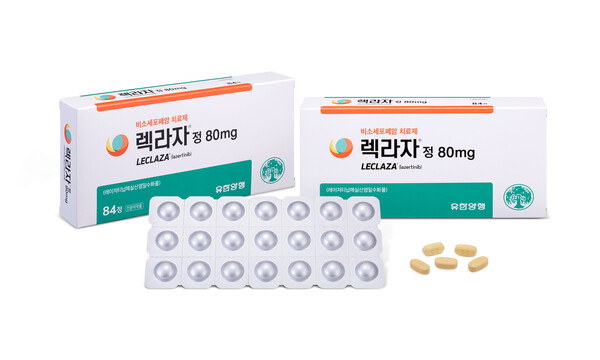The first real-world data (RWD) for Yuhan Corp.’s new lung cancer treatment Leclaza (lazertinib) in the second-line treatment of EGFR mutation-positive non-small cell lung cancer (NSCLC) in Korea has been released.

The research team, led by Professor Lim Sun-min at the Oncology Division of Yonsei Cancer Center and Professor Ahn Beung-chul at the Oncology Department of the National Cancer Center, confirmed the efficacy and safety of Leclaza in 103 patients with EGFR mutation-positive NSCLC who received Leclaza from January 2021 to August 2022 at Yonsei Cancer Center and the National Cancer Center, among T790M-positive patients who developed resistance after prior EGFR-TKI therapy. The study results were published in the journal Lung Cancer.
The research team said the RWD study confirmed the consistent efficacy and safety of Leclaza in the second-line treatment of patients with EGFR T790M-mutated NSCLC in real-world clinical practice. Of the 103 patients analyzed, 90 received Leclaza as a second- or third-line treatment.
The study's primary endpoint was median progression-free survival (mPFS), which the study found to be 13.9 months. This is consistent with the 11.1-month mPFSl seen in the LASER201 study, the licensed clinical trial for Leclaza.
The objective response rate (ORR) was 62.1 percent, similar to the 55.3 percent seen in the LASER201 study. Safety was also well-tolerated, similar to previous studies.
"This study is significant in that it is the first real-world study to confirm the efficacy and safety profile of Leclaza in patients with NSCLC in an actual Korean prescribing setting," said Professor Lim."The analysis confirmed data consistent with Leclaza's licensed clinical trials, and these RWD results, along with other clinical data, can be actively utilized as a basis for prescribing Leclaza to patients in clinical settings."
Lim also added that the research team saw similar efficacy in patients with the Exon19 deletion mutation (Exon19del) and the L858R substitution mutation (L858R), and no decrease in efficacy in patients on a dose reduction.
In this RWD study, the treatment effect of Leclaza in patients with brain metastases was equally significant as in the LASER201 study. In 33 patients with brain metastases with analyzable intracranial lesions, the median intracranial progression-free survival (mIPFS) was 17.1 months, with an objective response rate of 57.6 percent.
"Brain metastases are common enough that approximately 25 percent of patients with NSCLC are found to have brain metastases at diagnosis, and 50 percent of patients will eventually develop brain metastases during the course of their disease," said Professor Ahn. "The brain metastatic effect of a drug is an important consideration in real-world prescribing situations."
"Through this real-world study, Leclaza has consistently demonstrated anti-tumor activity in brain metastases, and we are building the evidence base to prescribe Leclaza to patients with NSCLC in Korea," Ahn added.
Related articles
- Tagrisso vs. Leclaza – let the best drug win
- [Top K-Pharma Analysis ⑤] Yuhan goes all-in in new drug R&D, despite profit decline
- Aiming at ‘2nd Leclaza,’ Yuhan quickens steps to develop new drugs in 2023
- Yuhan to apply for FDA nod for Leclaza as 1st-line NSCLC therapy next year
- Yuhan’s Leclaza records 20.6-month mPFS as 1st-line NSCLC therapy
- Aptamer Sciences' non-reimbursed early detection lung cancer kits available at tertiary hospitals
- Yuhan's Leclaza indication expanded as 1st-line NSCLC treatment
- Leclaza shows benefits of homegrown new drug

